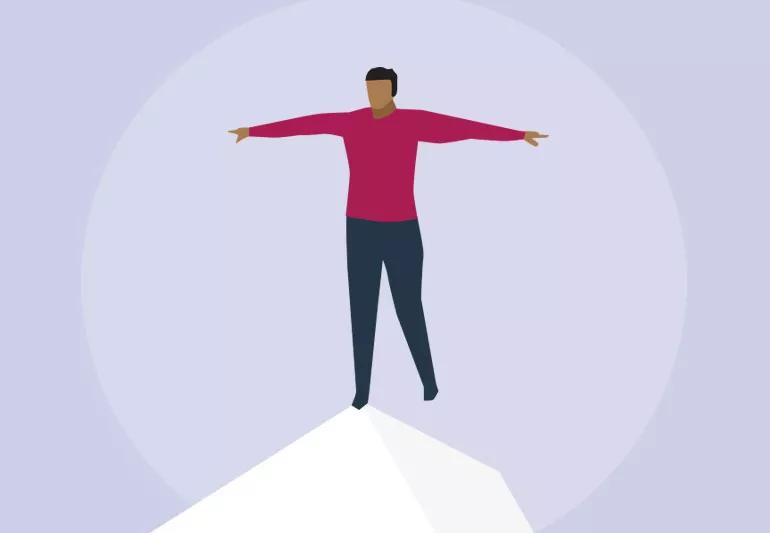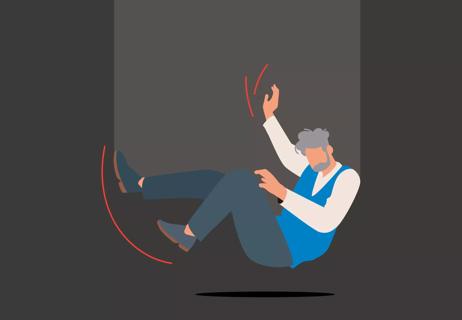Is it clumsiness or something more serious?

You bump into tables all the time. You’ve lost count of the number of times you’ve stubbed your little toe on the doorframe. When you practice yoga, your tree pose looks more like a … fallen tree.
Advertisement
Cleveland Clinic is a non-profit academic medical center. Advertising on our site helps support our mission. We do not endorse non-Cleveland Clinic products or services. Policy
Are you a little clumsy? Or could your balance problem be something bigger?
Usually, true balance disorders go beyond run-of-the-mill klutziness, says audiologist Julie Honaker, PhD, CCCA, Director of the Vestibular and Balance Disorders Program.
But “balance disorders” include a broad range of problems, from minor lightheadedness to feeling like you’re standing on a boat (on one foot, during a hurricane).
Dr. Honaker shares more about the common causes of balance problems — and how to keep marching steady.
The inner ear is the HQ for the body’s balance, or vestibular, system. When something goes awry with that system, a whole range of symptoms can result, including:
Any number of other things can knock your balance off-kilter, Dr. Honaker says. Something relatively minor, like dehydration or fatigue, can cause a bout of unsteadiness. But what if you’re hydrated, rested — and still stumbling? These are some of the usual suspects.
Medication is one of the most common culprits of balance problems.
Advertisement
“So often, dizziness is listed as a side effect of medications,” Dr. Honaker points out. If you’re taking multiple prescription meds, they’re even more likely to interact in ways that leave you wobbly.
A virus can infect the ear and derail your sense of balance. Sometimes, colds can cause pressure changes in the middle ear, with the same dizzying effects. These infections usually resolve on their own.
Don’t get too excited — this is less blingy than it sounds. Turns out, we have tiny crystals of calcium carbonate in the inner ear, which play a role in gravity sensing. (Who knew?) Sometimes, the crystals meander into parts of the inner ear where they don’t belong, Dr. Honaker says.
When that happens, you can feel like the room is whirling around you — especially when you move your head suddenly, like rolling over in bed or tipping your head back for a shampoo at the salon. The official name of this disorder is a mouthful: benign paroxysmal positional vertigo. It’s the most common cause of vertigo (and, phew, it’s treatable).
Meniere’s disease causes large amounts of fluid to collect in the inner ear. In addition to dizziness, it can cause hearing problems and ringing in the ears.
The bad news: Meniere’s attacks are unpredictable and may be severe. The good news: You can often manage the disease with diet changes and medication.
You are older and wiser — but perhaps slightly less steady. The inner ear balance system can decline as you age, Dr. Honaker says. Meanwhile, the strength of your eyesight, hearing and even sense of touch can deteriorate — all of which can contribute to poor balance.
But pull on your yoga pants and grab your mat, because balance-boosting exercises like tai chi and yoga can help keep you steady. “It’s important to engage our balance system through regular exercise,” Dr. Honaker says. “If you don’t use it, you lose it.”
If something seems off with your balance, it’s wise to see a doctor to investigate possible suspects, Dr. Honaker says.
Inner ear problems are often to blame, so definitely mention symptoms such as changes in hearing, ringing or a feeling of fullness in the ears. But sometimes, the problem is related to other issues, such as neurological problems or even heart problems.
Since so many different things can mess with your balance, it makes sense to talk to your primary care doctor first. He or she can help narrow down the suspect list before you visit any specialists.
Many vestibular problems are treatable, Dr. Honaker says, so don’t be afraid to get to the bottom of it.
Advertisement
To prevent falls, Dr. Honaker has this advice:
Advertisement

Sign up for our Health Essentials emails for expert guidance on nutrition, fitness, sleep, skin care and more.
Learn more about our editorial process.
Advertisement

Building lower body strength is key to staying upright, particularly as you age

A study found that you might live longer if you can stand on one leg — but it’s far from a perfect indication of longevity

Staying active and doing what you love may increase both your confidence and your balance

Exploring mal de debarquement

This spinning sensation is a symptom, not a condition, so you need to know what’s causing it before you can treat it

Perfecting the squat before trying a lunge can start you off on the right foot

Staying active can help increase strength and flexibility, help maintain balance and coordination, and improve overall heart health

As the degenerative disease progresses, different mobility aids like a walker or wheelchair may be needed

Even small moments of time outdoors can help reduce stress, boost mood and restore a sense of calm

A correct prescription helps your eyes see clearly — but as natural changes occur, you may need stronger or different eyeglasses

Both are medical emergencies, but they are very distinct events with different causes